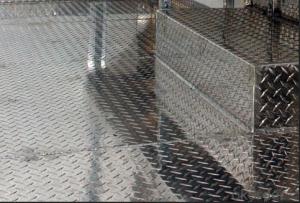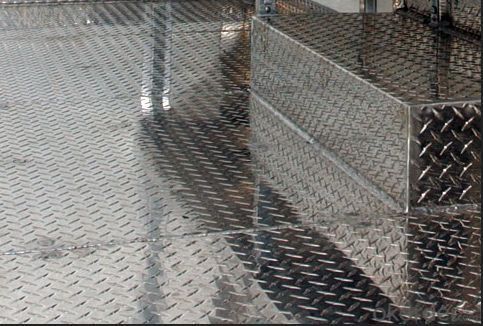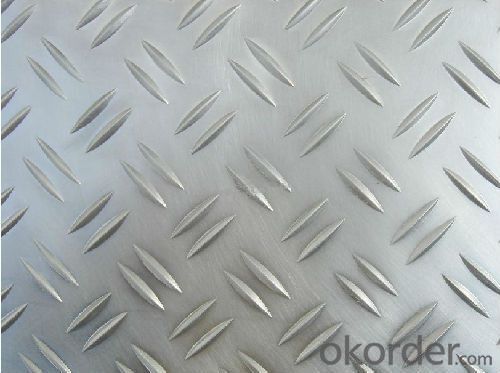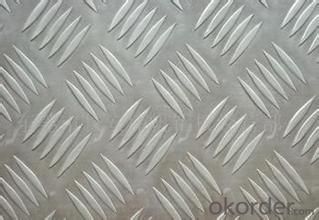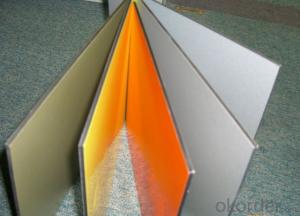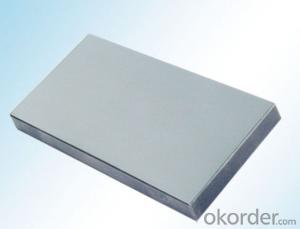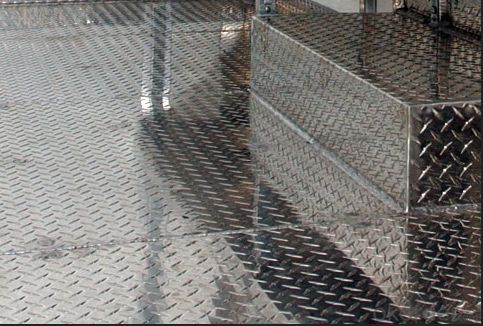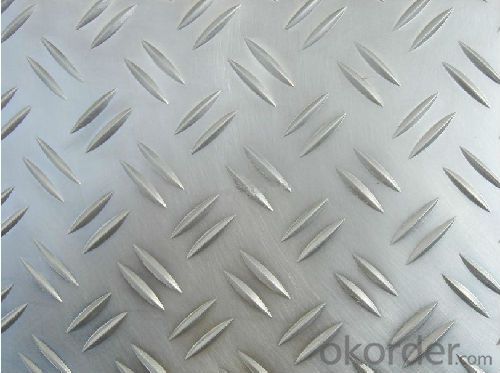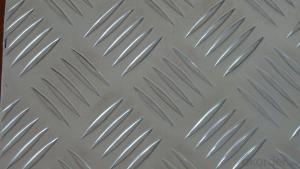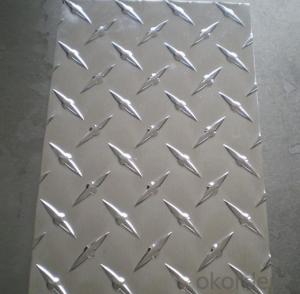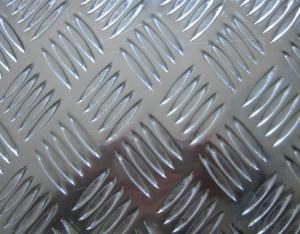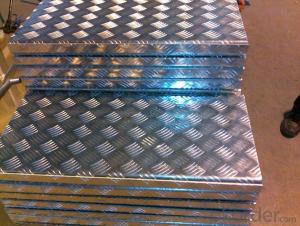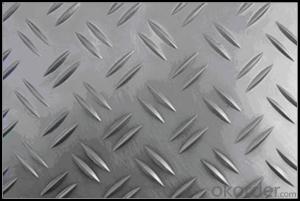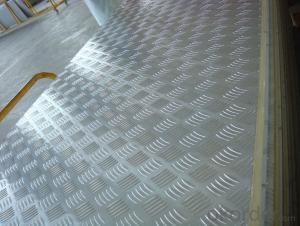Alumco Manufactures Anti-Slip Aluminum Checkered Plate for Truck
- Loading Port:
- Shanghai
- Payment Terms:
- TT OR LC
- Min Order Qty:
- 5 m.t.
- Supply Capability:
- 9000 m.t./month
OKorder Service Pledge
Quality Product, Order Online Tracking, Timely Delivery
OKorder Financial Service
Credit Rating, Credit Services, Credit Purchasing
You Might Also Like
Specification
Grade:
1000 Series,3000 Series,4000 Series,5000 Series,6000 Series,7000 Series,2000 Series
Surface Treatment:
Coated,Embossed,Anodized,Polished,Mill Finish,Color Coated,Oxidized,Enameled Wire,Brushed,Printed,Composited,Holographic Impression,Sand Blasted,Powder Coating
Shape:
Angle,Square,T-Profile,Round,Flat,Rectangular,Oval,Hexagonal
Temper:
T3-T8,O-H112,T351-T651,T351-T851,Soft,Half Hard,Hard
Application:
Liner & Wad,Decorations,Door & Window,Heat Sink,Transportation Tools,Glass Wall,Food,Kitchen Use,Pharmaceutical,Seal & Closure,Insulation Material,Label & Tag
1 Specifications of Anti-slip Aluminum Checkered Plate For Truck Body
Main Specification | |
Alloy | AA1xxx (AA1050, AA1060, AA1070, AA1100 etc. |
AA3xxx (AA3003, AA3004, AA3005, AA3105 etc. | |
AA5xxx (AA5052, AA5754, AA5083 etc. | |
Temper | H14, H18, H24, H26, H32 |
Thickness | 0.2mm-20mm |
Width | 10mm-1500mm |
Embossed Patterns | Diamond, Stucco, Bars etc. |
Standard | GB/T 3880-2006 |
Special specification is available on customer’s requirement | |
2 Usage/Applications of Anti-slip Aluminum Checkered Plate For Truck Body
3 Packaging & Delivery
| Packaging Details: | Anti-slip Aluminum Checkered Plate For Truck body 1000~2500 kg can be packed in wooden pallet. Each paper interleaved 17~19 ton can be loaded in 1 x 20 container if standard size 1220 x 2440 mm 20~22 ton can be loaded in 1 x 20 container if standard size 1000 x 2000mm |
| Delivery Detail: | in 30 days after we received your advance payment. |
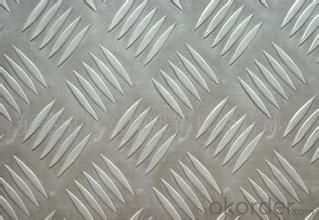
- Q: A construction worker uses a steel tape to measure the length of an aluminum support column. If the measured length is 17.7 m when the temperature is 21.2°C, what is the measured length when the temperature rises to 35.4°C? (Note: Do not neglect the expansion of the steel tape. Give your answer to three decimal places.)I am really confused... Could someone solve it for me with a step-by-step explanation? Thank you so much.
- Assume linear thermal expansion with constant expansion coefficient. The change of length is given by: ΔL = L?·α·ΔT (L? initial length, α linear thermal expansion coefficient) The overall length of an object as function of temperature is: L= L? + ΔL = (1 + α·ΔT) · L? Consider the measurement at 21.2°C as reference: The aluminum column changes its length to L= (1 + α_aluminum · ΔT) · L? = (1 + 23×10-6 ^C°-1 · (35.4°C - 21.2°C) ) · 17.7m = 17.705m That would be the length measured with a steel tape at reference temperature of 21.2°C. Unfortunately the steel tape expands too. Because the scale increases with the expansion it measures too short. On the expanded tape you read the length L? while the actual length is L. Hence the measured length is: L? = L / (1 + α_steel · ΔT) = 17.705m / (1 + 11×10-6 ^C°-1 · (35.4°C - 21.2°C) ) = 17.003m
- Q: Can the aluminum sheets be used for insulation purposes?
- Yes, aluminum sheets can be used for insulation purposes. Aluminum is a good conductor of heat, which means it can effectively prevent the transfer of heat between two surfaces. Aluminum sheets can be installed as a reflective barrier in walls, roofs, or floors to reduce heat transfer by reflecting radiant heat. They can also be used as a vapor barrier to prevent moisture from entering or escaping a space. Additionally, aluminum sheets can be used as part of a insulation system, where they are combined with other insulating materials such as foam or fiberglass to enhance their thermal insulation properties. Overall, aluminum sheets can provide effective insulation and contribute to energy efficiency in buildings.
- Q: My understanding of the periodic table, the transitional metals all rust because the S shells are higher energy then the D shells. So all transitional metals have 2 valence electrons. (Roughly...some electrons like to move around and give different apparent charges.) So why does aluminum corrode if it doesn't have a 2+ charge?
- 'Rusting' commonly refers to the corrosion (oxidation) of iron so when talking about other metals, it is better to use the term 'corrosion' or 'oxidation'. Aluminum can corrode and the fact that it has a general oxidation number of +3 doesn't really matter. Many elements which have a charge that is different from +2 can oxidize. Alkali metals for instance (which have a charge of +1) can oxidize. Lithium can form lithium oxide (Li2O), sodium can form sodium oxide (Na2O) and so on. However, aluminum is known to be quite resistant to corrosion (oxidation) because it spontaneously forms a thin (solid) oxide layer at it's surface protecting it from further oxidation whereas iron, for an example, will easily lose that thin layer (it ''peels off easily'') exposing more iron to corrosion. So since Al has a +3 charge and O has a -2 charge, you'll need 2 atoms of Al and 3 atoms of O to make an electrically neutral compound. 2 atoms of Al = +6 charge 3 atoms of O = -6 charge Hence Al2O3 which is aluminum oxide. I hope it helps.
- Q: How do aluminum sheets perform in terms of water resistance?
- Aluminum sheets generally exhibit excellent water resistance due to their natural oxide layer, which forms a protective barrier against corrosion. This oxide layer prevents water from penetrating the surface, making aluminum sheets highly resistant to water damage and rusting.
- Q: Can the aluminum sheets be bent or formed into different shapes?
- Yes, aluminum sheets can be easily bent or formed into different shapes. Aluminum is a highly malleable metal, meaning it can be easily manipulated without breaking or cracking. This property makes it ideal for various applications where flexibility and customization are required. Aluminum sheets can be bent, folded, rolled, or formed using a variety of techniques such as press brakes, rollers, or specialized forming tools. This versatility allows for the creation of complex shapes and structures, making aluminum a popular choice in industries like construction, automotive, aerospace, and manufacturing.
- Q: How do aluminum sheets compare to other metals in terms of strength?
- Aluminum sheets generally have lower strength compared to other metals. While aluminum is lightweight and has excellent corrosion resistance, it is not as strong as metals such as steel or titanium. Aluminum has a lower tensile strength and yield strength compared to these metals, making it more susceptible to deformation and failure under heavy loads. However, aluminum can be alloyed with other elements to improve its strength, and specific aluminum alloys can rival or even surpass the strength of some other metals. Additionally, aluminum's strength-to-weight ratio is one of its main advantages, making it a preferred choice in many industries where weight reduction is crucial, such as aerospace and automotive. Overall, while aluminum may not be the strongest metal in absolute terms, it offers a balance of strength, lightweight properties, and corrosion resistance that makes it a versatile material in various applications.
- Q: What is the thermal conductivity of 101 aluminum sheets?
- The thermal conductivity of 101 aluminum sheets is approximately 209 W/m·K.
- Q: I don't like purchasing deoderants that contain aluminum sulfate due to the fact that a build-up of aluminum may cause Alzheimer's (my grandfather has it). So, I purchased an all natural deoderant only to later look more closely at the labely and see POTASSIUM ALUM....hmmm, alum versus aluminum? Supposedly alum cannot be absorbed by the skin so it's safe....any proof?
- Potassium Alum: KAl(SO4)2 Aluminum Sulfate: Al2(SO4)3 Both compounds contain aluminum. Potassium alum is actually very soluble in water so it can probably be absorbed through the skin. Once it is broken down by the water in sweat, it can probably get back under your skin.
- Q: I put the aluminum in copper chloride for an experiment and i was wondering if they had different properites.
- Yes, Rust is an Oxide of iron which can be broken down chemically into simpler substances. Aluminium is a pure Element which cannot be broken down chemically or physically into other substances.
- Q: Are aluminum sheets suitable for heat exchangers?
- Aluminum sheets, indeed, are well-suited for heat exchangers due to their numerous advantageous qualities. Firstly, aluminum, being a highly conductive metal, facilitates efficient heat transfer, effectively enhancing the performance of the heat exchanger. Furthermore, its lightweight composition simplifies the handling and installation process within heat exchanger systems. Moreover, aluminum exhibits remarkable resistance against corrosion, guaranteeing the heat exchanger's endurance and sturdiness. Additionally, the malleability of aluminum sheets enables effortless shaping and sizing, thus enabling customization for various heat exchanger designs. In summary, aluminum sheets provide exceptional thermal conductivity, corrosion resistance, and versatility, rendering them a fitting choice for heat exchanger applications.
Send your message to us
Alumco Manufactures Anti-Slip Aluminum Checkered Plate for Truck
- Loading Port:
- Shanghai
- Payment Terms:
- TT OR LC
- Min Order Qty:
- 5 m.t.
- Supply Capability:
- 9000 m.t./month
OKorder Service Pledge
Quality Product, Order Online Tracking, Timely Delivery
OKorder Financial Service
Credit Rating, Credit Services, Credit Purchasing
Similar products
Hot products
Hot Searches
Related keywords
